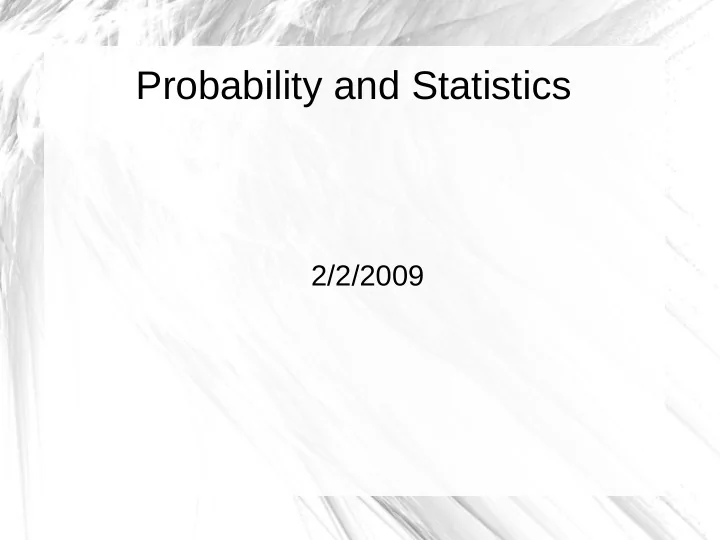

Probability and Statistics 2/2/2009
Opening Discussion ● What did we talk about last class?
Random Variables ● This is a sequence of random numbers. ● Discrete – The values can only take on a countable number of possibilities. ● Continuous – The value comes from a non-countable set.
Differential Distribution Functions ● Your book calls these probability distribution functions. ● Discrete p x i = P X = x i – ∞ ∑ p x i = 1 – i = 1 ● Continuous x x P X ∈[ x , x x ]= ∫ f y dy – ∞ x ∫ – f x dx = 1 −∞
Cumulative Distribution Functions ● Discrete F x = ∑ p x i – x i ≤ x ● Continuous – F(x)=P(X<=x) or x – F x = ∫ f y dy −∞
Mean or Expected Value ● Discrete ∞ E X i = i = ∑ x j p X i x j – j = 1 ● Continuous ∞ E X i = i = ∫ xf X i x dx – −∞ ● Properties E cX = cE X – n n E ∑ c i X i = ∑ – c i E X i i = 1 i = 1
Median ● Discrete – Smallest x such that F(x)>=0.5 ● Continuous – F(x)=0.5
Variance 2 = E [ X i − i 2 ]= E X i 2 − i 2 i ● ● Standard deviation is square root of variance. ● Properties Var X ≥ 0 2 Var X Var cX = c n n Var ∑ X i = ∑ Var X i i = 1 i = 1
Covariance C ij = E [ X i − i X j − j ]= E X i X j − i j ● ● Measures correlation between random variables. ● Independent random variables have C ij =0. ● Sign tells you if they are positively of negatively correlated ● Correlation ρ ij fixes units problem.
Stochastic Processes ● This is a collection of similar random variables ordered over time. Our simulation outputs can be considered to be stochastic processes. ● Covariance-stationary implies that the mean and variance don't change over time.
Minute Essay ● Do you have any questions about what we covered today?
Recommend
More recommend